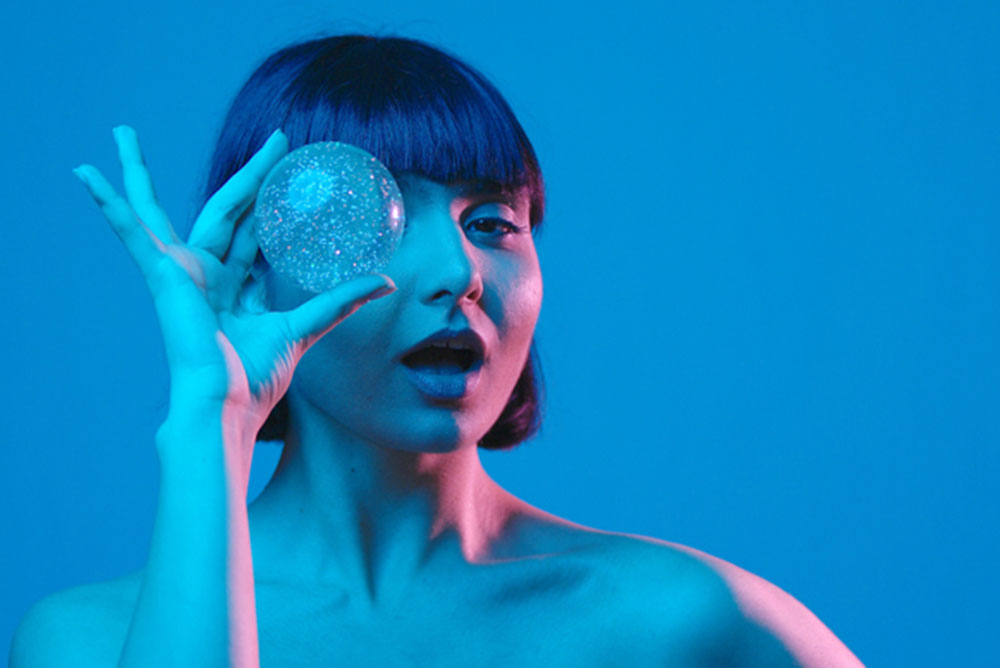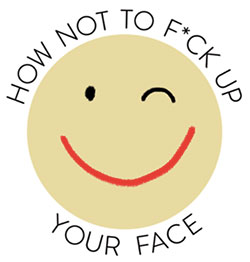
iStock

Can’t get enough Valerie Monroe? There’s more at https://valeriemonroe.substack.com.
By Valerie Monroe
ORDER, ORDER! But first, chaos.
I started this post thinking I’d tell you, in a straightforward way, the order in which you should apply your face products. Then I wondered what products you might be using. And then I tripped on questions of why you might be using them and what you might expect from them before I finally tumbled down a dark and deep rabbit hole from which I was sore afraid for a hellish 72 hours I would never return.
I spent that time researching over-the-counter skincare ingredients, poring over old interviews with skincare pros, watching videos of panels of experts, and speaking with Michelle Yagoda, MD, a highly knowledgeable facial plastic surgeon and skincare and supplement co-creator and patentee. I took notes. I developed a twitch in my eye and a bad feeling (dread). Finally, I passed out and had a nightmare. And when I awoke, I had an epiphany: I am confused. I was so confused that even when I staggered into the bathroom to look into my own eyes, I wasn’t sure who I was looking at.
I thought, What’s wrong with me that I can’t figure out what basic products you absolutely need and what they will do for you? There must be someone out there who can give me the perfect solution: a cream, a lotion, a gel that gives you the most bang for your buck. I had a second epiphany: No, there isn’t such a person. This confusion, this yearning, is exactly what the beauty industry wants me to feel. And I imagine you, at one time or another, have felt the same way.
Which inevitably leads to one or two conclusions. You spend money on products that may or may not perform as well as you expect, if they do anything at all. You might rightly think of this as a waste of money. But there’s a steeper price you pay, because you are led to expect results that may not happen. This can inspire a feedback loop of rightly thinking you’ve made a mistake: in choosing the wrong product, in not using it properly, in not educating yourself, or worse, in being beyond repair—which leaves you feeling not only disappointed, but also something like a failure. There are so many choices and you haven’t yet made the right one—but you just know there’s something better you haven’t tried.
I’m not saying there aren’t over-the-counter ingredients that can improve the quality of your skin; retinols (vitamin A derivatives) and glycolics (acids), among a few others, can minimize the appearance of fine lines and even-out tone and texture.
There’s a refrain among beauty publicists that the skincare product consumer is more educated than ever. But educated by whom? Magazines (or what’s left of them), newspapers, and most of social media are still beholden, to one degree or another, to advertisers. As Naomi Wolf wrote in her seminal book The Beauty Myth, media has to project the idea that aging looks bad because hundreds of millions of ad revenue dollars come from people who would be out of business if they proclaimed that visible age looked good. So how can you trust anything you read? You can’t. “Consumer advocacy studies ‘hire’ participants to give positive subjective reviews. They’re biased and worthless,” says Yagoda. “Most beauty copy cites these studies. ‘Peer reviewed studies’ are also meaningless and less common. The only valuable studies are those using placebo versus control, double-blind methods conducted by independent physicians. Studies by paid physician consultants obviously cause a conflict of interest and prey upon consumers—traditionally women.”
The one thing you can be sure the beauty industry produces most successfully? Hype.
For a thousand years I told my mother and my friends that uber-expensive moisturizers weren’t worth the money. They believed me. But they believed me only when I was standing in front of them staring intently into their eyes. Because again and again they would later ask me, “Does fill-in-the-blank $$$ moisturizer eliminate wrinkles and sagging?” And I’d answer with an exasperated, “No, you’re mostly paying for expensive packaging and the very marketing techniques that got you back here asking a question you already know the answer to.”
Formulation chemist Jen Novakovich confirms that effective moisturizers aren’t wildly expensive to produce. She says she priced out the formula of a 100 ml container of hyaluronic acid serum selling for $800 and discovered production cost was only around $3.00/100ml. She didn’t say if the container was lined in gold.
She also confirms you can find a perfectly good moisturizer for much, much less. As long as it contains moisturizing ingredients, occlusives (like oils or silicones), humectants (like hyaluronic acid or glycerin), and/or emollients (like butters), and your skin seems to like it, you’ll get good transient results. I say transient because the product isn’t changing your skin except for temporarily plumping it, which diminishes the appearance of fine lines and wrinkles.
You can also make a very good drugstore moisturizer feel extravagant. Just steal a bit of the expensive marketing that keeps hooking you and use it in your own bathroom. Instead of slapping on your cream or lotion, pump a little into your palm. (Or use a tiny spatula to scoop it out of the jar.) Warm it up between your hands and then pat it gently onto your cheeks, chin, forehead, and nose. Lightly drum your fingertips across your cheeks. Take a deep breath. Look into your eyes. Your skin is thoroughly moisturized and you just saved a few hundred dollars. Doesn’t that feel good?
I think I also have to tell you that if it makes you happy to spend $800 on a moisturizer, go right ahead. You like the smell, the texture, the story, the bottle? All yours!
But back to addressing the original question. Here’s the order in which, according to Yagoda, you should apply products.
Basically, go from lightest to heaviest. If you use a serum in the morning, apply that first after cleansing. Why use a serum? According to many dermatologists, there’s compelling evidence that vitamin C serum helps reduce oxidative cell damage (caused by sunlight and other environmental factors). Novakovich believes another vitamin called niacinamide has better stability than vitamin C and better clinical evidence about combating free-radicals. But she says doctors seem to like vitamin C more. I’m not sure why; my guess is that vitamin C is easier to sell than niacina-what? Anyway, a serum’s light formula allows its active ingredients to be rapidly absorbed. I don’t use a serum but this one has a cult following, and Yagoda likes this one.
At night, you’ll apply a serum or treatment product (like a prescription retinoid) after cleansing. (I use a trifecta of the ingredients tretinoin, azelaic acid, and niacinamide in a prescription formula I get from Curology. Full disclosure, I was on its VIP list for many years, meaning I haven’t paid for it. But that’s not why I use it; I use it because the company’s formulas contain actives with proven results.)
Next comes moisturizer, which forms a kind of barrier to seal in hydration and to keep out dirt and grime. A $30-40 moisturizer will do this as well as any. Both this optionand this option are frequently recommended by dermatologists. At night I wait a few minutes before applying moisturizer over my treatment lotion because I like giving the lotion time to absorb. It dries almost instantly and I’ve never found any proof that a treatment lotion is more effective if you wait before applying a moisturizer, but I do it anyway because…beauty magic.
Finally, in the morning, apply sunscreen last. It’s the most important product you can put on your face—the first line of defense against environmental irritants and the sun’s damaging UV rays. (What does damaging mean? Destruction of collagen and elastin, causing wrinkles and sagging, and proliferation of dark spots. Also, skin cancer.) Wearing a sunscreen like this or this is one of the most effective ways to ensure a healthy—and therefore healthy-looking—complexion. It isn’t magic. It’s common sense.


I’ve been following the lightest to heaviest mantra for years, topped by a sunscreen moisturizer every day. I think my skin looks pretty good for a 70 year old. My serum is the CE Ferulic from Skinceuticals. I feel like if I stopped using it my skin would fall apart. Probably addicted at this point!